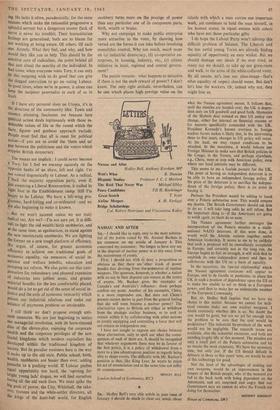SIR,—Hedley Bull's very able article in your issue of January
4 should do much to clear our minds about SIR,—Hedley Bull's very able article in your issue of January 4 should do much to clear our minds about
what the Nassau agreement means. It follows that, until the missiles are handed over, the UK is depen- dent only on US goodwill and good faith. Memories of the Skybolt deal remind us that US policy can change, either for internal or financial reasons or for reasons specifically connected with the UK.
President Kennedy's known aversion to foreign nuclear forces makes it likely that, in the intervening three to five years, changes in US policy will occur.
At the least, we may expect conditions to be attached. In the meantime, it would behove our Foreign Minister to make sure that British policies in
the Congo, in the Yemen, and perhaps elsewhere, e.g., China, were in step with American policy, even where our local interests may be different.
This seems to me a foolish posture for the UK. The point of having an independent deterrent is to
be able to have an independent foreign policy. If the price of the deterrent is to sacrifice the indepen- dence of the foreign policy, there is no point in buying it.
Perhaps the President would be willing to hand over a Polaris submarine now. This would remove my doubts. The British Government should ask him to do so. I will take long odds he will refuse. But the important thing is—if the Americans are going to welsh again, let them do so soon.
The Nassau agreement further envisages the incorporation of the Polaris missiles in a multi- national NATO deterrent. If this were done, it would weld the Atlantic nations together under American leadership. It seems to me to be unlikely that such a proposal will be immediately acceptable in Europe, and certainly not in the long run. As Europe begins to feel its strength, it will wish first to establish its own independent power and then to collaborate with the US on a basis of equality.
In the meantime, the 'special relationship' which the Nassau agreement continues will appear to Europe, and to de Gaulle in particular, to place the UK in such a position of dependence upon the US as to make her unable to act or think as a European power, and thus to make her an undesirable member of the European Community.
But, sir, Hedley Bull implies that we have no choice in this matter, because we cannot for tech- nical reasons make our own nuclear weapons. I doubt extremely whether this is so. No doubt the cost would be great, but are we yet far enough into the problem to be sure that the cost would be prohibitive? The industrial by-products of the work would not be negligible. The research teams are available, also the industrial resources, and both are standing largely idle at this moment. The missiles are only a small part of the Polaris submarine and by no means the most expensive, We have the necessary time, but only just. If the US should default in delivery in three to five years' time, we would be out of this technology for good.
Not the least of the advantages of making our own weapons, would be an improvement in the
temper of the British people, who at the moment are fed to the back teeth with being dependent on the Americans, and are surprised and angry that our Government says we cannot do what the French are doing for themselves.
House of Commons, SW1
ANTHONY KERSHAW






























 Previous page
Previous page